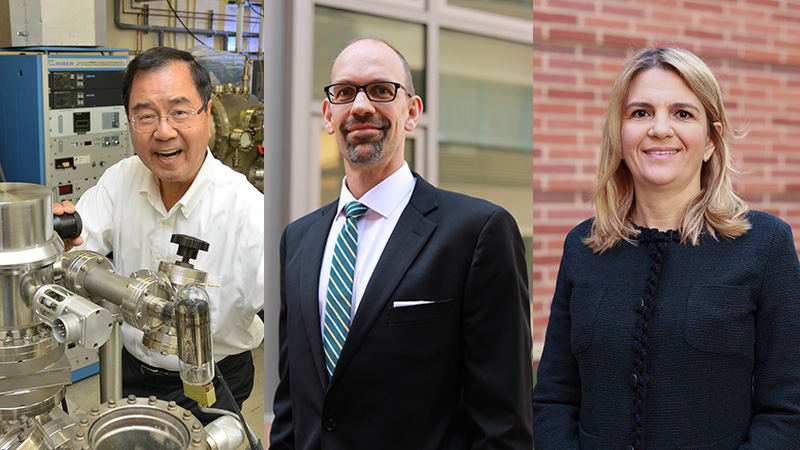UCLA Engineers Receive Three NSF Awards for Semiconductor Research

UCLA Samueli
Kang Wang (left), Benjamin Williams (center) and Danijela Cabric (right) have each received a National Science Foundation award for semiconductor research.
Three research teams led by the UCLA Samueli School of Engineering have been awarded research grants totaling $3.38 million by the National Science Foundation (NSF) through its Future of Semiconductors design and manufacturing program. Electrical and computer engineering distinguished professor Kang Wang, as well as professors and vice chairs Benjamin Williams and Danijela Cabric, lead the three projects, respectively.
Williams’ group has been awarded a three-year, $1.96 million grant to develop hybrid electronic-photonic semiconductor devices that operate at frequencies above 1 terahertz (THz). Current semiconductors fabricated at silicon-industry foundries can generate and detect radiation at ever-increasing frequencies, but the signals become weak at frequencies exceeding 1 THz. The researchers are pursuing an approach based on the heterogeneous integration of silicon electronic chips with III-V terahertz laser amplifier chips on a common THz interconnect platform. The resulting system is anticipated to operate above 1.5 THz, which will allow it to detect the telltale spectral fingerprints of a range of gases. The group plans to demonstrate the system’s performance in environmental, industrial and scientific sensing applications.
The team’s co-investigators are Mitchell Spearrin, an associate professor of mechanical and aerospace engineering; Aydin Babakhani, an associate professor of electrical and computer engineering; and Subramanian Iyer, director of the UCLA Center for Heterogeneous Integration and Performance Scaling and a distinguished professor of electrical and computer engineering. Iyer is currently on assignment as the director of the National Advanced Packaging Manufacturing program.
Wang, who is UCLA’s Raytheon Company Chair in Electrical Engineering, has been awarded a two-year, $945,000 grant to address issues in fabricating memory systems designed to increase data transfer to match modern processors’ speeds. His research group will explore the potential of using the Retunable Reconfigurable Racetrack-Memory Acceleration Platform (R3AP) to resolve challenges in systems that combine mature and cutting-edge chip technologies as a reconfigurable logic, processing-in-memory (PIM) accelerator and high-density memory storage. R3AP could be particularly powerful for internet-of-things devices and cyber-physical systems, as well as in high-performance and cloud-computing systems. Wang holds faculty appointments in electrical and computer engineering as well as materials science and engineering.
In collaboration with UC Berkeley and Boston University, Cabric has been awarded a three-year, $470,000 grant to develop next-generation wireless communications technologies that can enable advanced cell-free communication and multi-static sensing. The team will demonstrate millimeter wave-integrated circuits and systems that incorporate advanced electronic and photonic components for large-scale distributed antenna arrays. This research aims to create a new set of CODAeMIMO technologies enabling collaborative optically disaggregated extreme multiple-input, multiple-output high-capacity communication and high-fidelity sensing systems.
